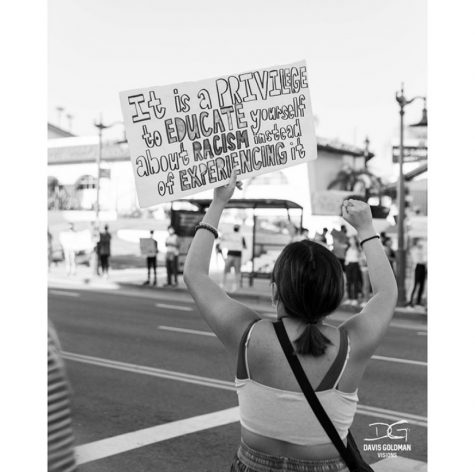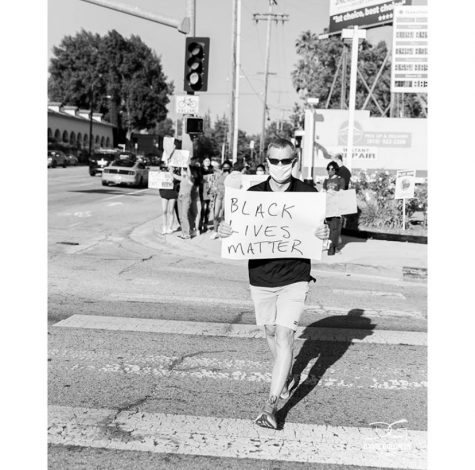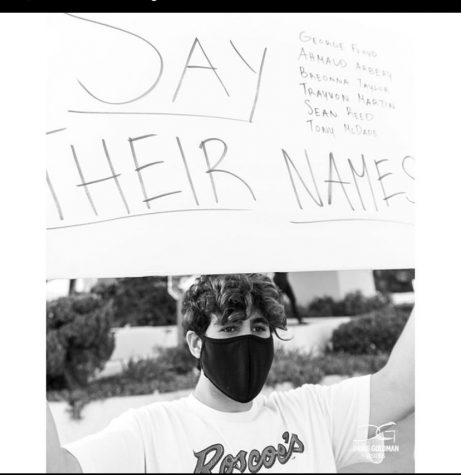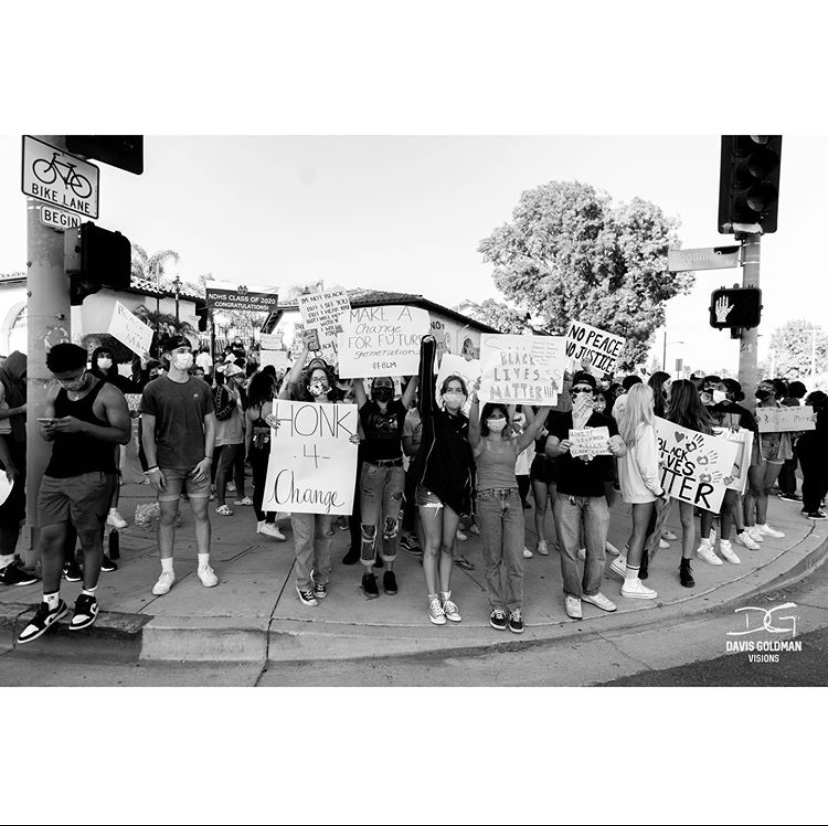Being Better Allies
How to Continue to Support the Black Lives Matter Movement
Davis Goldman ’20
ND students hold up their signs in support of Black Lives Matter while protesting next to Notre Dame.
Last updated October 7, 2020
After George Floyd’s death in May, there was immediate outrage which people took to the streets. Protests lasted for days all over the country. Many people attended protests, signed petitions, and donated to causes for weeks in support of the Black Lives Matter movement.
However, now that months have passed since his death, people seem to have almost forgotten the urgency of the situation, specifically white people, who don’t have to deal with the systemic racism our country has on a daily basis.
Many non-black people have begun to treat the Black Lives Matter movement as more of a trend then an actual movement. However, it is not. Black Lives Matter is still extremely important, and it is necessary that we become better white allies and continue to support the movement.

According to Hasan Kwame Jefferies, a history professor at Ohio State, “historically when Black people protest, they are responding to intolerable and immediate justice…in contrast, White Americans tend to protest over more abstract goals.” This difference was very evident in the case of George Floyd. While African Americans were fighting for the immediate injustice in his case, white people were protesting the larger picture. This is due to the fact that white people will never truly grasp what it is like to be someone of color.
It is extremely important to continue to amplify black people’s voices and listen to their stories of their struggles and oppression in America. We cannot be their voices or try to be white saviors. Non-black people do not get to decide what is racist and what is not. Rather, we must listen when black people call us out.
Emily Stewart, writer for Vox said, “Listen more than you speak. Do your research. […] It’s really important to learn the history of the struggle you’re putting yourself into, to learn about the systems of oppression that exist and how you’re complicit in them, and then, again, remember that it’s not our job to educate you. It’s not hard to educate yourself. You can literally google it.”
There are so many books, videos, and documentaries on the history of racism in America and how to be actively anti racist. With a quick google search, you can find thousands of articles and YouTube videos that can help educate you.
A good example of a white ally is Lily Skwarczeck ‘21, who created racial justice website, Silence is Complicity, on June 2nd. She said, “I published Silence is Complicity for resources for the protests and petitions and such but also for informative articles and to keep people up to date. After the death of George Floyd I talked to a lot of my POC, specifically black friends who were frustrated because people were coming to them asking for information and how to help as if it was their job. I thought about how exhausting that must’ve been especially in a time where BIPOC are also emotionally strained. I decided to make a website that included the time sensitive information for protesters, the up to date situation and information that was timeless that could tell people how to change their view. I spent 3 days nonstop making it as in depth as I could. After I published it my friend’s mom said it was amazing because people could find everything they needed to know without feeling judged for not knowing it.”
“It was the hardest to get through but most rewarding to make,” Lily said. “I didn’t feel like a savior or anything making the website but the idea that even one person could learn or not be as ignorant was enough to justify every hour of work.” Lily’s website: https://sites.google.com/view/silence-is-complicity/home
It is also important to understand and stop doing microaggressions. Microaggressions are, according to Merriam Webster, “a comment or action that subtly and often unconsciously or unintentionally expresses a prejudiced attitude toward a member of a marginalized group.” Racism can be phrases you might think aren’t substantial but really are. Examples of common microaggressions include, “You’re so articulate, “I’m not racist. I have a black friend,” and “I don’t see color.” Anti racism starts with you. Individual people need to stop giving in to stereotypes and microaggressions to be better allies.

Gabrielle Ellis, a ND alumni, said, “the best way to amplify AA voices is to advocate for them when there is no person of color in the room and by questioning derogatory terms and statements. As a person of color it is sometimes scary to stand up for myself when I am the only black person in a class, however if someone else questioned what was going on, I would be made compelled to voice my opinion.”
When asked how white people can ensure they are not gentrifying the movement she said, “the support should not just be made for sake of having an Instagram post or to make t- shirts and other material items which you can profit off of. If someone is making money due to the movement, then the money should be going toward the movement instead of for individual profit.”
About three months after the major protests throughout the world, we have to continue to amplify black peoples’ voices, spread petitions, and donate. Just because the news about Black Lives Matter has died down, does not mean that the fight is over. We cannot be performative activists. We must be better white allies for the black community.

Below are some ways you can help and get involved:
- Donate to Black Lives Matter. Founded in 2013 after the man who shot Trayvon Martin was acquitted
- Donate to the Equal Justice Initiative. This organization works to provide legal representation to those who have been wrongfully convicted, unfairly sentenced, or abused in jail.
- Donate to the National Bail out or the Bail Project.
- Donate to the Black Trans Protesters Emergency Fund
- Directly get into contact with African American families who have lost loved ones. Philonise Floyd set up a memorial for his brother and you can donate to the Floyd’s family GoFundMe. You can donate to Ahmaud Arbery’s family’s GoFundMe. Donate to Breonna Taylor’s family through their GoFundMe. Donate to David McAtee’s family’s GoFundMe.

